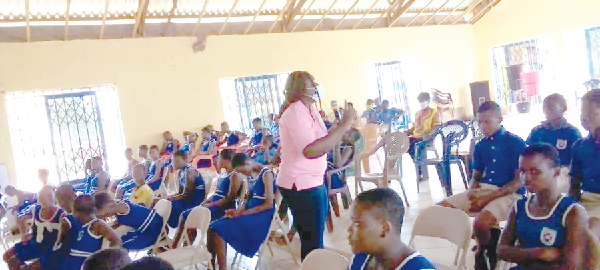
Lower Manya Krobo basic schools observe World Toilet Day
Basic schools in the Lower Manya Krobo Municipality in the Eastern Region have observed this year’s World Toilet Day with health education programmes on sanitation and personal hygiene.
The municipality programme, which was observed on the theme: ‘‘Observe personal hygiene, use toilet, stop open defecation,” was supported by the Kpong Ensign College of Public Health.
Advertisement
Some of the major activities to mark the day included cleaning of the school toilets, talk on toilet hygiene, hand washing with soap under running water, personal hygiene, demonstration lessons and activities on hygiene, quiz competitions on sanitation in schools, among others.
World Toilet Day is celebrated to raise awareness of the 3.6 billion people living without access to safely managed sanitation.
SDG Six
It is also about taking action to tackle the global sanitation crisis, achieve Sustainable Development Goals Six (SDG 6) on water and sanitation for all by 2030.
A Nurse at the Kpong Ensign College of Public Health, Ms Rebecca Ametepey, who led the team of other health workers through the activities of the day, noted with concern that when some people in a community did not have safe toilets, everyone’s life was threatened.
She explained that poor sanitation contaminated drinking water sources, river bodies, beaches and food crops, spreading deadly diseases among the wider population with Ghana and the Krobo area being no exception.
Ms Ametepey told the pupils that globally, it was estimated that at least 2 billion people used drinking water source which was contaminated with faeces, adding that over 700 children, under-five years old, died from diarrhea linked to unsafe water, sanitation and poor hygiene.
Investment in sanitation
Ms Ametepey said having access to safe sanitation was essential for the realisation of all human rights, saying toilets, particularly, drove improvements in gender equality, education, economics and the environment.
She advised the pupils to stop open defecation and use KVIP toilets properly and save medical bills that would be spent on them at hospitals should they fall sick.
A Midwife at the Asitey Community Health Centre, Ms Evelyn Doku, who took the participants through some health issues on sanitation, stressed the need for the pupils as well as the entire Asitey community to stop open defecation for their own good.
She noted that most of the cases that came to their attention were diarrhea- related health issues and called for sensitisation and education to prevent indiscriminate open defecation, which is a major source of cholera, typhoid fever and all other communicable diseases.
The Lower Manya Krobo Municipal School Health Education Programme (SHEP) Coordinator, Mr Godfried Ofoe Caesar, said the main aim of this year’s celebration was to give enough education on sanitation in order to avoid open defecation.
He encouraged them to observe proper sanitation at their various toilet facilities in order not to infect others.
A pupil of the Asitey Presbyterian Basic School, Mercy Mamle Djabatey, told the Daily Graphic that she was impressed with the sanitation education she and the others received and expressed the hope that they would use the information to protect them.



